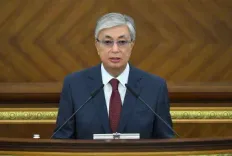Have Judges in Gauhati High Court Been Appointed by SC Collegium?

Synopsis
Key Takeaways
- SC Collegium's Approval: Two permanent judges appointed in Gauhati High Court.
- Extension of Tenure: Justice Kaushik Goswami's tenure extended by one year.
- Constitutional Guidelines: President appoints judges per Articles 217 and 224.
- Judicial Recommendations: 14 advocates recommended for elevation in Bombay High Court.
- Importance of MoP: Regulates the appointment process of High Court judges.
New Delhi, Aug 20 (NationPress) The Supreme Court Collegium, under the leadership of Chief Justice of India (CJI) BR Gavai, has sanctioned the appointment of two new permanent judges to the Gauhati High Court.
In a meeting held on August 19, 2025, the Collegium confirmed the elevation of the following Additional Judges to Permanent Judges: (i) Shri Justice Budi Habung, and (ii) Shri Justice N. Unni Krishnan Nair, as mentioned in the official communiqué from the apex court.
Additionally, the Collegium has decided to extend the tenure of Justice Kaushik Goswami, an Additional Judge at the Gauhati High Court, for another year starting from November 10, 2025.
According to Article 217 of the Constitution, the President is responsible for appointing the Chief Justice and Judges of the High Courts. Furthermore, Additional Judges can be appointed per Article 224, also by the President.
As outlined in the Memorandum of Procedure (MoP) governing the appointment of High Court judges, a Chief Justice should refrain from recommending an Additional Judge when a vacancy for a Permanent Judge exists.
Moreover, the CJI B.R. Gavai-led Supreme Court Collegium has also put forth recommendations for the elevation of 14 advocates as judges in the Bombay High Court.
The Chief Justice of the Bombay High Court, after consulting with two of his senior-most colleagues, has forwarded recommendations for the elevation of the following advocates: Nandesh Shankarrao Deshpande, Amit Satyavan Jamsandekar, Ashish Sahadev Chavan, Vaishali Nimbajirao Patil-Jadhav, Abasaheb Dharmaji Shinde, Farhan Parvez Dubashto, Siddheshwar Sundarrao Thombre, Mehroz Ashraf Khan Pathan, Ranjitsinha Raja Bhonsale, Sandesh Dadasaheb Patil, Shreeram Vinayak Shirsat, Hiten Shamrao Venegavkar, Rajnish Ratnakar Vyas, and Raj Damodar Wakode.







